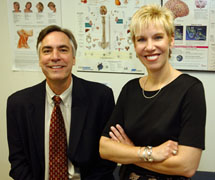|
The
Mean Disease
Emory’s
Fuqua Center helps combat depression in the elderly
The
first time severe depression settled onto William R. King Jr.
’38C-’41M, he was a young doctor in Griffin, Georgia.
The year was 1956, and King was building a practice with his two
younger brothers, also doctors.
“I
was practicing surgery, working very hard day and night, and
was under tremendous amounts of stress with no outlets,”
he says.
 King
(left) underwent psychoanalysis and within six months his depression
was gone. But, like an unwelcome acquaintance, it returned almost
fifty years later when King was eighty-three, sapping his energy,
taking away his appetite, and stealing his enthusiasm. King
(left) underwent psychoanalysis and within six months his depression
was gone. But, like an unwelcome acquaintance, it returned almost
fifty years later when King was eighty-three, sapping his energy,
taking away his appetite, and stealing his enthusiasm.
“Everything
was an effort, even walking or thinking,” he says. “Depression
is a mean disease.”
When
Virginia Allen, of Atlanta, started withdrawing from her usual
activities and going into seclusion over a period of several
months, she couldn’t figure out what was wrong. “I
spent all day sitting in a recliner,” she says.
“I
thought, well, a seventy-six-year-old woman ought to walk with
a cane and sit in a chair.”
As
many as two million of the country’s thirty-five million
seniors, age sixty-five and above, suffer from major depression,
and five million have depressive symptoms such as lethargy,
lack of interest in normal activities, or sleeplessness, according
to the National Institute of Mental Health.
Unfortunately,
depression often goes underdiagnosed in the elderly, says Eve
Byrd, associate director of the Fuqua Center for Late-Life Depression
at Emory’s Wesley Woods. Only a small percentage receive
treatment from mental health professionals.
“People
think, ‘Oh, I’m just getting old.’ Or, ‘I’m
not sad, I just don’t have any energy.’ Or, ‘I
just have too much to do and I can’t concentrate.’
Depression can be numbing,” says Byrd. “Also, people
of this generation believe you should be able to ‘pull
yourself up by your bootstraps.’ They aren’t used
to relying on anyone but themselves. But you can’t just
snap yourself out of depression.”
The
Fuqua Center seeks to improve this inequity. Working with health
professionals, clergy, and caregivers, the center provides a
full spectrum of services, from in-patient to day treatment
programs to group therapy. The center emphasizes community outreach,
conducting educational programs at assisted living facilities,
nursing homes, and senior communities.
Atlanta
businessman J.B. Fuqua, whose donations established the Fuqua
Center in 1999 as well as an academic chair in late-life depression
in 2003, suffered from the illness for much of his life.
 “Mr.
Fuqua has made a huge difference in our ability to reach out
to–and help–a large group of elderly persons who have
traditionally suffered in silence,” says William McDonald,
associate professor of psychiatry and director of the Fuqua
Center (at left with Eve Byrd, associate director of the Fuqua
Center). McDonald holds the J.B. Fuqua Chair in Late-Life Depression. “Mr.
Fuqua has made a huge difference in our ability to reach out
to–and help–a large group of elderly persons who have
traditionally suffered in silence,” says William McDonald,
associate professor of psychiatry and director of the Fuqua
Center (at left with Eve Byrd, associate director of the Fuqua
Center). McDonald holds the J.B. Fuqua Chair in Late-Life Depression.
More than fourteen thousand seniors have been served since the
center started, including King and Allen, whose depressions
lifted almost immediately with proper treatment.
Now
seventy-nine, Allen golfs regularly and walks three miles a
day. “Life is once again really and truly a joy,”
she says. She attributes the difference to the Electro-Convulsive
Therapy (ECT) treatments she received at Wesley Woods.
“ECT
is not our first-line treatment, but it is a very effective
treatment for depression,” Byrd says. “There are a
lot of preconceived notions about ECT, but it’s very safe.”
ECT,
which involves passing an electric current through the brain,
has been used for decades on patients with severe depression
or mania. The treatment appears to trigger the release of neurotransmitters,
which leads to an antidepressant effect. With sedation, muscle
relaxants, and IV fluids, the procedure is far less intense
than in the past, and has minimal side effects, although it
can result in short-term memory loss.
King,
now eighty-seven, was treated with counseling and medication.
He has resumed playing golf twice a week, walking two miles
a day, and tending to Robbin Hills, his seven-hundred acre farm
just outside of Griffin, Georgia. He has returned to leading
roles in his church, community, and charities like the Salvation
Army and the Boys and Girls clubs. He and his wife, Mariella,
have traveled to Norway, South Africa, Australia, and France.
“I
have a busy, happy life. I’m happy within my skin,”
he says. “The more I give to life, the more it gives to
me.”–M.J.L.
For
more information, call the Fuqua Center at 877.498.0096, or
visit the Web site at http://fuqua.emoryhealthcare.org. The
Eldercare Locator, a nationwide toll-free service, is also available
to help older adults and caregivers find local services, at
800.677.1116.
|
J.
B. Fuqua’s depression
led him to help others
Atlanta
businessman John Brooks Fuqua is, by all accounts, a consummate
deal-maker and supremely confident man.
His
Fortune 500 company, Fuqua Industries–a conglomerate
of businesses as diverse as Snapper Power Equipment Company,
Pier 1, and a savings and loan–at one point had annual
sales of two billion dollars.
Despite
his success and personal fortune, however, J.B. Fuqua
was sometimes immobilized by unpredictable bouts of hopelessness
and despair, which could last from days to months.
Since
publicly acknowledging his illness, Fuqua has given more
than four million dollars to promote awareness of depression
and remove the stigma.
“People
have said that my coming out and saying I had depression
caused them to want to seek some help themselves,”
said Fuqua, now eighty-five. “And that’s what
I had hoped to accomplish.”–M.J.L.
|
|